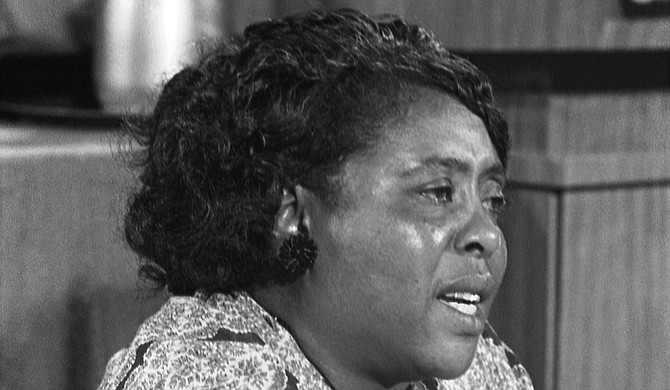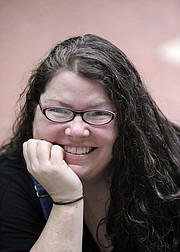Fannie Lou Hamer was a Mississippian who decided she was “tired of being sick and tired” of the power structures and racism in Mississippi. Photo courtesy Warren K. Leffler/U.S. News & World Report Magazine
On election night, as results confirmed the sweep of one party in all statewide races, predictable bromides began appearing on social media; "Mississippi is a lost cause" sums up the gist of them. Many shared their plans to move out of state, their grief and anger.
I get it. I really do. I chose to make my home here 23 years ago. Mississippi has broken my heart on many more than one occasion. So, I hope everyone who worked hard will take the time to regroup and repair.
We must remember that, as of 2016, Mississippi had more than 445,000 unregistered voters. They lean toward voters under 30, black, brown and poor. By comparison, Trump beat Clinton by fewer than 214,000 votes in the U.S. But our candidates and campaigns do not generally appeal to a broader, younger generation.
Too many Democratic candidates lean so far to the right to appeal to some magical swing voter that they seem to cease being Democrats. We've yet to have enough progressive candidates whose campaigns might compel Mississippians who have been hurting to get out to vote in the numbers needed to change the power structure.
It will not matter how many progressive candidates we may have if we don't do the everyday, unglamorous work of registering voters, educating voters and mobilizing voters to vote. We can't only care about Mississippians' lives for the five days before an election, if that. The small but mighty progressive community in Mississippi is doing its damndest on shoestring budgets and prayers but are far and away under-resourced, understaffed and overwhelmed.
Trump won Mississippi by almost 18 points in 2016. Democratic gubernatorial nominee Jim Hood closed much of that gap to within six points. Mike Espy worked to within four points last fall for the U.S. Senate seat. That, my friends, is something to build on. Build and fight.
I'm not upset with folks who didn't vote. Between state officials' efforts to suppress voting and our inability to truly address the suffering of so many in the state, I can understand those numbers.
So here is who gets my anger post-election: wealthy Democrats in the state who don't believe in, understand, or invest in community building and organizing; a national party apparatus that refuses to support that work; and national foundations that will not pool resources and make significant and extended investments in community organizing and capacity building.
National foundations supported the civil-rights work of the 1950s and '60s, often funneling money through regional organizations like the Southern Regional Council. In a backlash to the Civil Rights Movement's successes, many of those same foundations pulled back from progressive work, and few have returned.
When I get down about all this, I remember the story of the Montgomery Bus Boycott. The real one, not the "fake news" that "Rosa sat down, Martin stood up, and now everyone is free" fairy tale. I remember that Joann Robinson and the Women's Political Caucus were organizing six years before Mrs. Parks was arrested and had a plan in place when the opportunity came.
I remember Ella Baker, who trained Mrs. Parks in organizing and challenging white supremacy at Highlander Folk School in the 1940s. (She wasn't too tired to get up; she chose to remain seated and defy a segregation ordinance.) E.D. Nixon, head of the local NAACP, and Vernon Johns, challenged white supremacy in spite of the potential for violent backlash.
I remember 15-year-old Claudette Colvin, who was also arrested for refusing to give up her seat and who, in the courtroom later, confounded the judge, who thought that this young person, this black woman, couldn't have possibly come up with this idea on her own. In response to his query as to who the leaders were that had prompted her action, she replied with wisdom: "Our leaders is just we ourself."
So, here is who is going to save Mississippi: us. Let's connect to neighbors and friends who want a better Mississippi for all of us. If there isn't a group near you, start one. Just grab the first couple of people who share your values of social justice and inclusion and go to lunch. Get to know each other. Do it again and invite more friends. Build trusting relationships.
Educate yourself about your community. Who is hurting there? Who's helping? Support them. Ask why there is suffering; get to and study the attitudes and systems that undergird suffering. Pool your money to support candidates with your values. Set up voter-registration tables at local libraries, gas stations, grocery stores.
Strategize at the local and statewide levels. Be both patient and righteously indignant. Organizing takes time, and then sometimes a spark can catch and change things in an instant. But only those who have been organizing for the long haul can take advantage of sparks—the wood has to have been cut and collected—the kindling must be ready to light. This is how we win. And we bring everyone with us.
Mrs. Hamer, Medgar Evers, Duncan Gray, Unita Blackwell, and so many others stayed in this state and fought for it with their dying breaths. We can do no less.
Susan M. Glisson is a historian and co-founder and partner in Sustainable Equity (www.sustainableequity.net).



